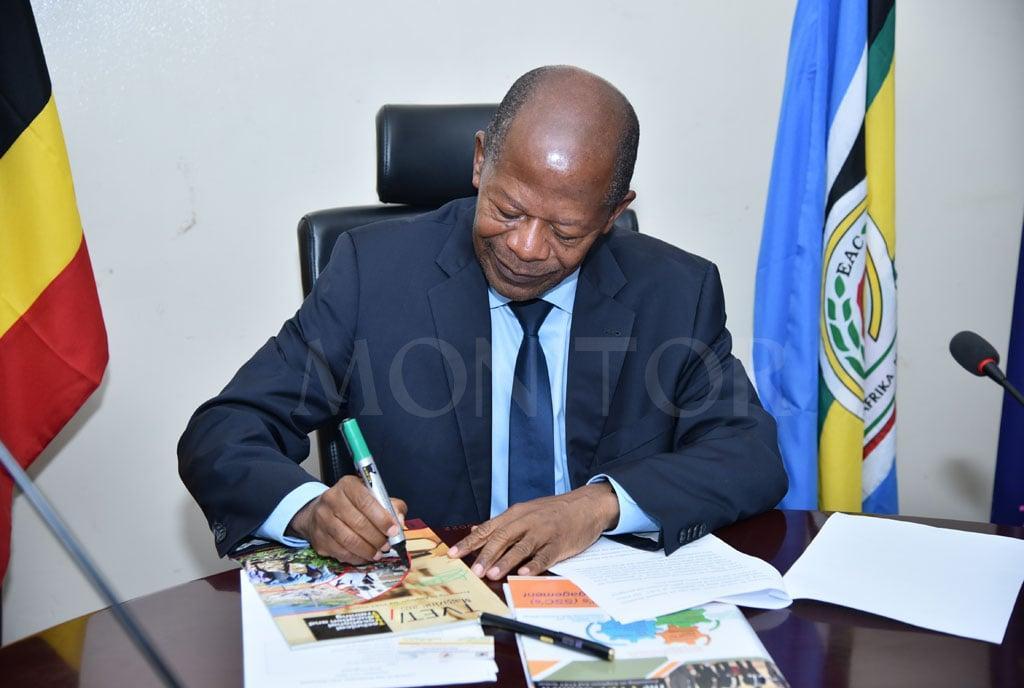Africa-Press – Uganda. The State Minister for Higher Education has directed the National Council for Higher Education (NCHE), the statutory regulator, to meet stakeholders and urgently resolve the crisis of institutions teaching “expired” programmes.
Dr John Chrysostom Muyingo’s order followed NCHE’s listing on its website of up to 2,260 programmes tenable at universities and tertiary institutions as expired, meaning not accredited to be taught.
The categorisation is based on a failure by affected institutions to seek fresh authorisation in line with the law to continue administering same or varied version of the degree and diploma programmes, leaving current course students and graduates with an uncertain future since their academic awards cannot legally be recognised.
The numbers of such affected alumni and students could not be established, but officials of universities on Monday argued that the threats were exaggerated.
The University of Bristol in the United Kingdom was the first to flag the glitch, turning away graduate studies’ applicants from Uganda, noting completed first degrees in programmes that NHCE already listed as “expired”.
In an interview with Daily Monitor yesterday, Minister Muyingo said he had directed top officials at the NCHE to sort the “mess with immediate effect”.
“I have asked the Executive Director of NCHE (Prof Mary Okwakol) to meet with the affected institutions to find ways of getting out of this crisis in the shortest period possible without making our learners lose out,” he said.
That meeting, sources familiar with the arrangement said, is expected to happen within this week amid piling political and international pressure on validity of higher education academic awards in periods referenced by the statutory regulator.
Minister Muyingo said whereas institutions have the primary mandate to ensure that the courses they offer are accredited and up-to-date, the NCHE as a regulator bears responsibility to ensure compliance.
“It is unfortunate that some of our institutions have been operating outside the law. We cannot accept anything that brings the quality of our education down. All guidelines must be followed by these institutions to the last dot,” he said.
When asked about the fate of students studying or have graduated on expired programmes, the minister said “this is the responsibility of the regulator, which in this case, is the NCHE”.
“They should look into all issues and come up with solutions without disadvantaging [anyone],” Dr Muyingo said.
The revelation about expired being taught at institutions of higher learning has sparked public consternation and ire, with demands by sections of legislators and a forum of student guild leaders across universities that culpable.
Education ministry has officially said nothing about the debacle despite holding the overall mandate for policy and political supervision, technical support and coordination as well as quality education.
Dr Jane Egua, who heads higher and technical, vocational education and training, said they will issue an official statement soon but that NCHE is already working out a solution.
A senior educationist said top bureaucrats at the ministry had come under pressure following the revelations of expired courses on offer at universities and tertiary institution to unsuspecting students, with political supervisors demanding answers from those who slept on their jobs.
One source, speaking on condition of anonymity due to the sensitivity of the matter, said university leaders and quality assurance officials are on the spot over how the institutions found themselves admitting and teaching students on unaccredited programmes.
“Are the people employed in quality assurance doing their job? We could start solving this programme by firing all those officials working in quality assurance. Because these are supposed to work 25/seven to ensure quality education in their respective institutions,” the official said.
In comments on Sunday, Mr Bernard Oundo, the president of Uganda Law Society, which advises governments and public entities on legal matters, blamed the institutions, saying under the law they hold the primary obligation to ensure that the programmes they teach are valid.
For More News And Analysis About Uganda Follow Africa-Press






